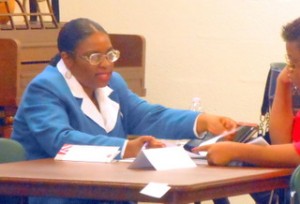The recent Congressional Black Caucus Forum on “Re-entry Citizenship” highlighted the need for many more Pro Bono days of the type to be offered by the Baltimore County Bar Association, Maryland Volunteer Lawyers, and Legal Aid Bureau from 9 a.m. – noon on Oct. 18 at the Community College of Baltimore County (CCBC), 3637 Offutt Rd., Randallstown.

Attorney Lauren Walker is one of several volunteer lawyers.
While October is National Po Bono Month, Pro Bono Days have been held each April and October in Baltimore County for the past four years, and at other times in Baltimore City and other jurisdictions, These days offer brief opportunities for free legal advice on a walk-in basis.
The issue areas covered include divorce and custody, landlord-tenant rights, wills and advance medical directives, special education, government and veteran benefits, bankruptcy, and now increasingly requests for criminal record expungement.
On Pro Bono (for free) Days, clients are first pre-screened to determine the various types of legal advice they require from the 30 or so lawyers on hand. Attorneys provide free legal advice to clients for about 15 minutes, during which time they can advise which forms, locations, and services to access to help remedy a legal matter. In some cases, assistance forms are printed on the spot. Many court services that formerly required attorneys can now be completed and filed on a “self-help basis”with appropriate instruction.
Therefore, it is incumbent that petitioners for expungement arrive at Pro bono Days with complete information about their cases. “We want to accommodate as many individuals as possible, so we have sometimes had to extend our day from three to four hours,” said Doris Barnes of the Baltimore County Bar Association.
Most police arrest records and court records of conviction, nolle pros, or probation before judgment can be expunged three years after the arrest. This can be done without an attorney’s assistance by filing a petition called a “General Waiver and Release with the Court. Clients can obtain forms online and in courthouses, and represent themselves, “Pro Se”, for expungement hearings.
Nearly 200 Congressional Black Caucus attendees participated in the four-hour issue forum organized by U.S. Rep. Daniel Davis (D – Ill.) to discuss “reentry citizens,” and the services they require. A reentry citizens are an ex-offenders, those who have committed felony crimes, which cause them to lose their citizenship rights for varying amounts of time.
Progressive states like Maryland have programs that shorten the time to obtain health insurance, driver’s licenses, a social security card, and even a voter’s card. However, few states, including Maryland, focus the same attention on the critical need for record expungement three years later, causing freed individuals to live needlessly impaired lived for years by less access to housing, credit, and jobs.
“There are now too many reentry citizens to marginalize them forever. In some urban areas where their presence has become ‘the norm,’ marginalization no longer makes sense from an economic or workforce standpoint. Governments and society must recognize that most incarcerated individuals will be released eventually, so why not begin the process of helping them restore their citizenship rights months before their release,” said Davis.

